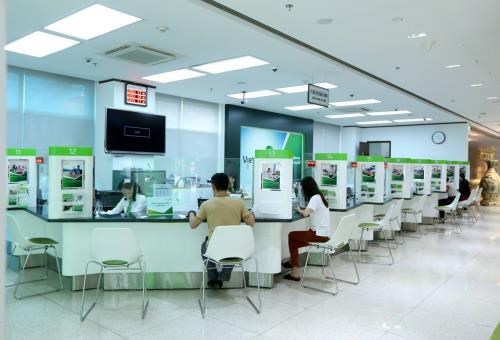Banks make great strides in technology application
Vietnam’s banking sector has invested in developing technology amid the sweeping changes the 4th Industrial Revolution is bringing to the way people live and work.
 A transaction office of Vietcombank (Source: VNA)
A transaction office of Vietcombank (Source: VNA)Hanoi (VNA) - Vietnam’s banking sector has invested in developing technology amid the sweeping changes the 4th Industrial Revolution is bringing to the way people live and work.
According to economic experts, the prominent technological advances of the revolution such as Internet of Things (IoTs), Big Data, Artificial Intelligence (AI) and blockchain technology have offered great opportunities for Vietnam’s banking system.
They help Vietnamese banks access international markets, enhance their ability to apply modern technology and make banking products and services more modern and efficient.
Dr. Nguyen Viet Loi , Director of Institute for Financial Strategy and Policy under the Ministry of Finance, said the impact of the 4th Industrial Revolution on Vietnam’s banking sector can be divided into two phases.
From 2008 to 2015, the advent of cloud computing, open-source software, 3G/4G mobile data, smart phones, data analysis and social networks encouraged entrepreneurs to join the financial market, paving the way for financial technology (FinTech).
From 2016-2020, the development of artificial intelligence, blockchain, data science, digital identification and biometrics will lay an infrastructure foundation to transform personnel usage, focusing on using artificial intelligence instead of traditional bankers. Digital identity has become the footing of basic identification and been secured through biometric factors such as voice recognition or fingerprints.
Experts predicted that by 2020, the four most-affected areas of FinTech will be consumer banking, transfers and payments, asset management, and insurance.
Findings from a survey on banking services, user behaviour and trends in Vietnam released by the International Data Group (IDG) Vietnam in 2017 showed that e-banking solutions are increasingly used for convenience and to save time. Some 81 percent of respondents said they have used e-banking solutions for transactions, compared to only 21 percent in 2015.
Deputy Governor of the State Bank of Vietnam (SBV) Nguyen Kim Anh said that commercial banks have developed new services in the direction of full digitisation.
Outstanding services include the auto banking model (Livebank) of Tien Phong Bank (TPBank), the digital bank Timo of Vietnam Prosperity Bank (VPBank), the digital banking strategy of Orient Commercial Joint Stock Bank (OCB); Digital Lap of Commercial Bank for Foreign Trade of Vietnam (Vietcombank) and the Military Commercial Joint Stock Bank (MB) with the virtual assistant application Chatbox.
Nguyen Hung, General Director of TPBank, said digitalisation is applied to all banking products and services from payment, money transfer, lending, saving to financial management.
The development of digital banking models, such as Timo or LiveBank, is an example of this trend, enabling banks to meet young customers’ need for banking services anytime and anywhere, he noted.
Ngo Thi Hang from the Department for inspection and supervision of domestic credit institutions under the SBV’s Banking Supervision Agency said the emergence of the 4th Industrial Revolution brings opportunities to Vietnamese banks to extend outside of the country, expand their activity and build their brand abroad.
In addition, thanks to the revolution, they can also access and expand supply of appropriate banking products and services to those who do not currently have bank accounts in remote areas, she said.
However, she noted that besides the promising opportunities, the revolution also poses many challenges to Vietnam's banking and finance sector.
Hang stressed the need to build new laws for banking sector reform, adding that banks’ business models and financial resources for basic construction investment need to be fine-tuned to adapt to the trend of high technology application.
According to Director Loi, the SBV has been setting up a Steering Committee on Fintech, which is working to develop a legal framework for this area.
However, there is still a lack of policy mechanism to attract investment in Fintech, he noted.-VNA













